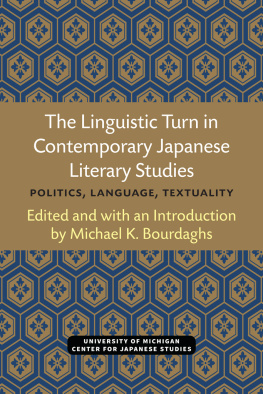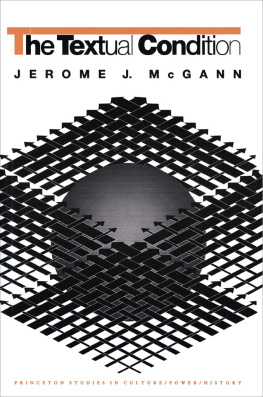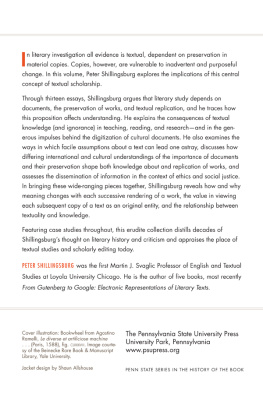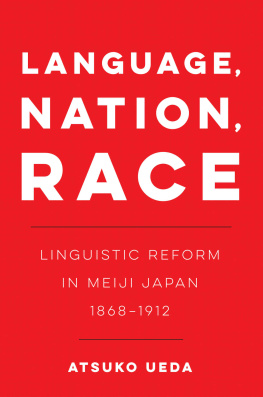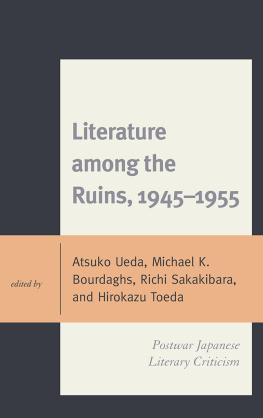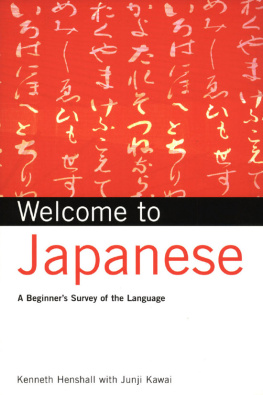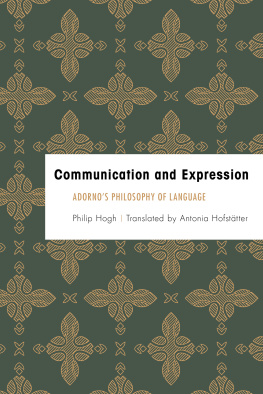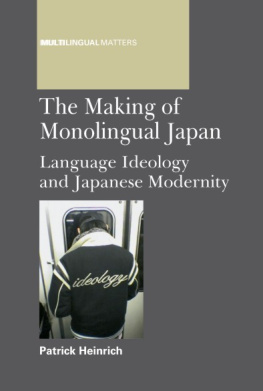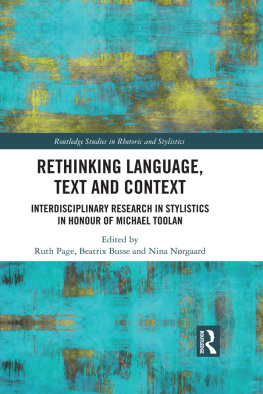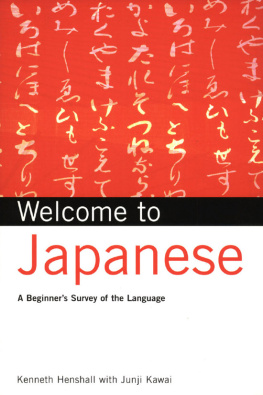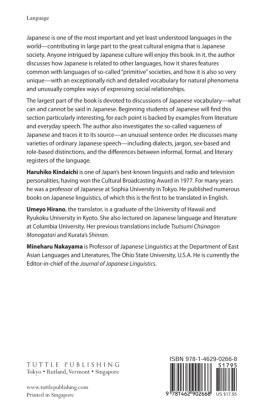The Linguistic Turn in Contemporary Japanese Literary Studies
Michigan Monograph Series in Japanese Studies
Number 68
Center for Japanese Studies
The University of Michigan
Open access edition funded by the National Endowment for the Humanities/Andrew W. Mellon Foundation Humanities Open Book Program.
Copyright 2010 by The Regents of the University of Michigan
Published by the Center for Japanese Studies,
The University of Michigan
1007 E. Huron St.
Ann Arbor, MI 48104-1690
Library of Congress Cataloging in Publication Data
The linguistic turn in contemporary Japanese literary studies : politics, language, textuality / edited by Michael K. Bourdaghs.
p. cm. (Michigan monograph series in Japanese studies ; no. 68)
Includes index.
ISBN 978-1-929280-60-5 (cloth : alk. paper) ISBN 978-1-929280-61-2 (pbk. : alk. paper)
1. Japanese literatureShowa period, 1926-1989History and criticismTheory, etc. 2. Japanese literatureHeisei period, 1989 History and criticismTheory, etc. 3. Linguistics in literature. I. Bourdaghs, Michael K. II. Title. III. Series.
PL726.65.L56 2010
895.609382dc22
2010002115
This book was set in Palatino Macron.
This publication meets the ANSI/NISO Standards for Permanence of Paper for Publications and Documents in Libraries and Archives (Z39.48-1992).
Printed in the United States of America
ISBN 978-1-929280-60-5 (hardcover)
ISBN 978-1-929280-61-2 (paper)
ISBN 978-0-472-12748-1 (ebook)
ISBN 978-0-472-90143-2 (open access)
The text of this book is licensed under a Creative Commons Attribution-NonCommercial-NoDerivatives 4.0 International License: https://creativecommons.org/licenses/by-nc-nd/4.0/
In Memory of Mitani Kuniaki
(1941-2007)
Contents
Michael K. Bourdaghs
Noguchi Takehiko,translated by Suzette A. Duncan
Kamei Hideo, translated by Jennifer M. Lee
Hirata Yumi, translated by Tess M. Orth
Mitani Kuniaki, translated by Mamiko Suzuki
John Whitman
Katnei Hideo, translated by Jennifer Cullen
Richi Sakakibara
Norma Field
Kno Kensuke, translated by Christopher D. Scott
Guohe Zheng
Joseph Essertier
Leslie Winston
Introduction:
Overthrowing the Emperor in Japanese Literary Studies
Michael K. Bourdaghs
By the mid-1980s, the world of literary studies in Japan had been hearingrumbles of revolt for some time. For more than a decade, a new generationof scholars and journalist-critics (hyronka) had been chipping away at manyof the foundational assumptions that governed the study of literature, especiallymodern Japanese literature. Academics who preferred the old ways,however, could still dismiss the upstarts as mere journalists interested morein keeping up with fashionable trends in theory than in serious scholarship,or, better yet, they could simply ignore them.
But in 1985 the rebels showed up at the main gate to the palace, batteringram in hand. A group of younger scholars-most notably KomoriYichi (b. 1953) and Ishihara Chiaki (b. 1955)-launched a radical rereadingof Natsume Ssekis 1914 novel Kokoro (The Heart), a work that had longbeen central to the canon of modern Japanese literature. This marked theonset of what came to be known as the Kokoro rons (Kokoro debate), amultipronged dispute that would occupy center stage in the discipline forseveral years to come.
Where did the challengers come from? As scholars, both Komori andIshihara were trained in institutions that in some ways were peripheral tothe institution of literary studies in Japan, a position that likely predisposedthem toward innovations in approach. to suggest some sort of institutional determinism as an explanation for theirwork, clearly institutional positioning played a role in the debate.
But what really separated the two sides in the debate were fundamentaldifferences in theoretical and methodological grounding, especially intheir basic stances regarding the nature of communication, the structureof linguistic and semiotic processes, and the relationship between politicsand language. As a result, the debate provides a convenient entry way into adiscussion of the theoretical issues and historical events that link the essayspresented in this volume.
The new readings of Kokoro were deliberately provocative. Ishihara accusedprevious scholars of misreading the novel, of mistakenly lionizing the characterknown as Sensei. Whereas Sensei had long been celebrated for his ethicalityin the face of modern alienation and egotism, in fact-according toIshihara-his ethic was implicitly murderous, an infantile narcissism thataimed primarily to destroy the Other in order to preserve its fantasy notionof the self.
Response to these accusations was swift in coming. In particular,Miyoshi Yukio (1926-90), professor emeritus at Tokyo University-the heartof the scholarly establishment-became the central voice in defending theestablished readings and methodologies. Space constraints do not allow meto rehearse in any detail the course of the debate over Kokoro, and other scholarshave provided useful accounts, including Atsuko Sakaki and OshinoTakeshi. I will merely summarize a few of the positions that marked thenew readings of the novel by Komori and Ishihara, as well as the responsesmade by their critics, especially those that are relevant to a reconsiderationof the linguistic turn in recent Japanese literary criticism.
Whereas standard readings had always stressed the second half of thenovel, the section titled Sensei and His Testament, the new readings tendedto focus on the first half, the two sections narrated by the nameless student,who refers to himself using a polite form of the first-person pronoun in Japanese: Watakushi. The revisionist readings stressed Watakushis ethicalityover that of Sensei, and-perhaps the real source of outrage on the part of theestablishment-they speculated on the possibility of an erotic relationshipbetween Watakushi and Shizu, Senseis wife, after Senseis suicide. MiyoshiYukio titles one of his response pieces Was Sensei a Cuckold? a rhetoricalquestion that hints at the sense of outrage the new readings provoked.
In terms of methodology, Komoris radical new readings were alsomarked by an insistence on calling Kokoro a text (tekisuto in katakana) asopposed to a work (sakuhin). As Oshino notes, this methodological conflictwas at the core of the debate. In using the term text, Komori meant in partto stress the openness of Kokoro to its outside both in terms of its insistenceon intertextuality and in terms of its narrative incompletion, the openendednessof its story that seemed to require active intervention by thereader. By insisting that literary value lay not so much in the text itself as inthe relationship between the text and its reader, Komoris stance challengednot only the position of Kokoro as an anchor securing the national canon,but also that of Sseki as its author, who was no longer positioned as theguarantor of value standing behind the text. This novel about the death offather figures-including, notably, the Meiji Emperor-was transformed inthe Kokoro ronso into a topos for debating the death of the author in Japaneseliterary studies.
Komoris insistence on calling Kokoro a text was specifically a challengeto the widely used methodology of sakuhinron (studies of a single work),an approach closely identified with the figure of Miyoshi Yukio. Komorisattack on orthodox

